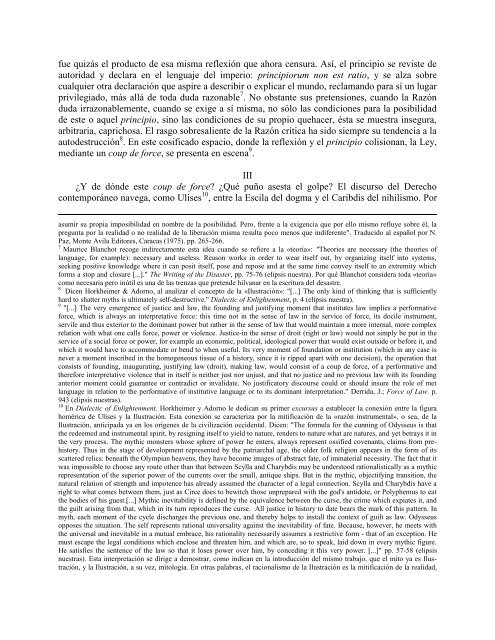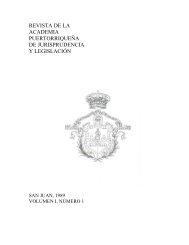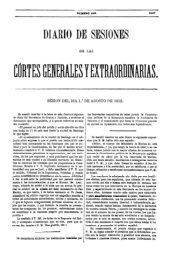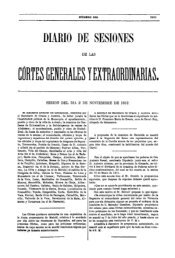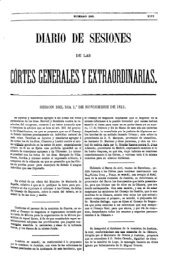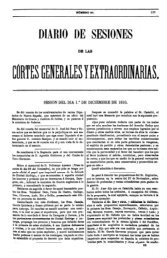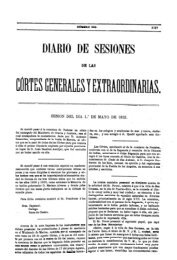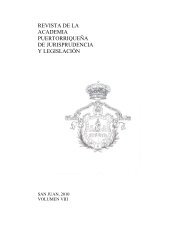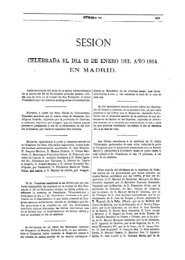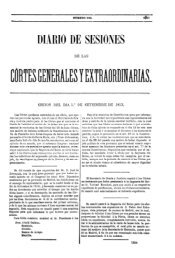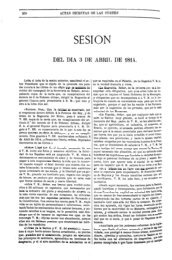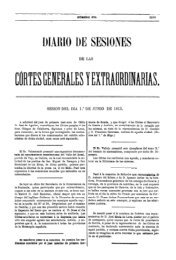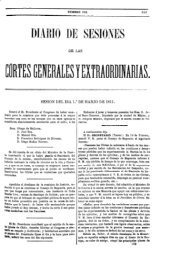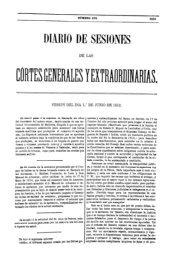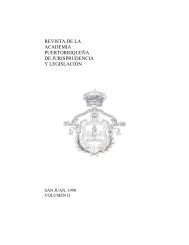fue quizás el producto <strong>de</strong> esa misma reflexión que ahora censura. Así, el principio se reviste <strong>de</strong>autoridad y <strong>de</strong>clara en el lenguaje <strong>de</strong>l imperio: principiorum non est ratio, y se alza sobrecualquier otra <strong>de</strong>claración que aspire a <strong>de</strong>scribir o explicar el mundo, reclamando para sí un lugarprivilegiado, más allá <strong>de</strong> toda duda razonable 7 . No obstante sus pretensiones, cuando la Razónduda irrazonablemente, cuando se exige a sí misma, no sólo las condiciones para la posibilidad<strong>de</strong> este o aquel principio, sino las condiciones <strong>de</strong> su propio quehacer, ésta se muestra insegura,arbitraria, caprichosa. El rasgo sobresaliente <strong>de</strong> la Razón crítica ha sido siempre su ten<strong>de</strong>ncia a laauto<strong>de</strong>strucción 8 . En este cosificado espacio, don<strong>de</strong> la reflexión y el principio colisionan, la Ley,mediante un coup <strong>de</strong> force, se presenta en escena 9 .III¿Y <strong>de</strong> dón<strong>de</strong> este coup <strong>de</strong> force? ¿Qué puño asesta el golpe? El discurso <strong>de</strong>l Derechocontemporáneo navega, como Ulises 10 , entre la Escila <strong>de</strong>l dogma y el Caribdis <strong>de</strong>l nihilismo. Porasumir su propia imposibilidad en nombre <strong>de</strong> la posibilidad. Pero, frente a la exigencia que por ello mismo refluye sobre él, lapregunta por la realidad o no realidad <strong>de</strong> la liberación misma resulta poco menos que indiferente". Traducido al español por N.Paz, Monte Avila Editores, Caracas (1975). pp. 265-266.7Maurice Blanchot recoge indirectamente esta i<strong>de</strong>a cuando se refiere a la «teoría»: "Theories are necessary (the theories oflanguage, for example): necessary and useless. Reason works in or<strong>de</strong>r to wear itself out, by organizing itself into systems,seeking positive knowledge where it can posit itself, pose and repose and at the same time convey itself to an extremity whichforms a stop and closure [...]." The Writing of the Disaster, pp. 75-76 (elipsis nuestra). Por qué Blanchot consi<strong>de</strong>ra toda «teoría»como necesaria pero inútil es una <strong>de</strong> las trenzas que preten<strong>de</strong> hilvanar en la escritura <strong>de</strong>l <strong>de</strong>sastre.8Dicen Horkheimer & Adorno, al analizar el concepto <strong>de</strong> la «Ilustración»: "[...] The only kind of thinking that is sufficientlyhard to shatter myths is ultimately self-<strong>de</strong>structive." Dialectic of Enlightenment, p. 4 (elipsis nuestra).9 "[...] The very emergence of justice and law, the founding and justifying moment that institutes law implies a performativeforce, which is always an interpretative force: this time not in the sense of law in the service of force, its docile instrument,servile and thus exterior to the dominant power but rather in the sense of law that would maintain a more internal, more complexrelation with what one calls force, power or violence. Justice-in the sense of droit (right or law) would not simply be put in theservice of a social force or power, for example an economic, political, i<strong>de</strong>ological power that would exist outsi<strong>de</strong> or before it, andwhich it would have to accommodate or bend to when useful. Its very moment of foundation or institution (which in any case isnever a moment inscribed in the homogeneous tissue of a history, since it is ripped apart with one <strong>de</strong>cision), the operation thatconsists of founding, inaugurating, justifying law (droit), making law, would consist of a coup <strong>de</strong> force, of a performative andtherefore interpretative violence that in itself is neither just nor unjust, and that no justice and no previous law with its foundinganterior moment could guarantee or contradict or invalidate. No justificatory discourse could or should insure the role of metlanguage in relation to the performative of institutive language or to its dominant interpretation." Derrida, J.; Force of Law. p.943 (elipsis nuestras).10En Dialectic of Enlightenment, Horkheimer y Adorno le <strong>de</strong>dican su primer excursus a establecer la conexión entre la figurahomérica <strong>de</strong> Ulises y la Ilustración. Esta conexión se caracteriza por la mitificación <strong>de</strong> la «razón instrumental», o sea, <strong>de</strong> laIlustración, anticipada ya en los orígenes <strong>de</strong> la civilización occi<strong>de</strong>ntal. Dicen: "The formula for the cunning of Odysseus is thatthe re<strong>de</strong>emed and instrumental spirit, by resigning itself to yield to nature, ren<strong>de</strong>rs to nature what are natures, and yet betrays it inthe very process. The mythic monsters whose sphere of power he enters, always represent ossified covenants, claims from prehistory.Thus in the stage of <strong>de</strong>velopment represented by the patriarchal age, the ol<strong>de</strong>r folk religion appears in the form of itsscattered relics: beneath the Olympian heavens, they have become images of abstract fate, of immaterial necessity. The fact that itwas impossible to choose any route other than that between Scylla and Charybdis may be un<strong>de</strong>rstood rationalistically as a mythicrepresentation of the superior power of the currents over the small, antique ships. But in the mythic, objectifying transition, thenatural relation of strength and impotence has already assumed the character of a legal connection. Scylla and Charybdis have aright to what comes between them, just as Circe does to bewitch those unprepared with the god's antidote, or Polyphemus to eatthe bodies of his guest.[...] Mythic inevitability is <strong>de</strong>fined by the equivalence between the curse, the crime which expiates it, andthe guilt arising from that, which in its turn reproduces the curse. All justice in history to date bears the mark of this pattern. Inmyth, each moment of the cycle discharges the previous one, and thereby helps to install the context of guilt as law. Odysseusopposes the situation. The self represents rational universality against the inevitability of fate. Because, however, he meets withthe universal and inevitable in a mutual embrace, his rationality necessarily assumes a restrictive form - that of an exception. Hemust escape the legal conditions which enclose and threaten him, and which are, so to speak, laid down in every mythic figure.He satisfies the sentence of the law so that it loses power over him, by conceding it this very power. [...]" pp. 57-58 (elipsisnuestras). Esta interpretación se dirige a <strong>de</strong>mostrar, como indican en la introducción <strong>de</strong>l mismo trabajo, que el mito ya es Ilustración,y la Ilustración, a su vez, mitología. En otras palabras, el racionalismo <strong>de</strong> la Ilustración es la mitificación <strong>de</strong> la realidad,
un lado, se levanta el argumento <strong>de</strong> la imperiosa necesidad <strong>de</strong> proveerle a la Razón unfundamento que legitime sus esfuerzos por inventar la realidad; necesidad que nace <strong>de</strong> la propiarazón, al contemplar con terror la ficción <strong>de</strong> su propio fundamento. El terror al abismo, a su falta<strong>de</strong> justificación o legitimación, es el secreto a voces que se encubre bajo el manto <strong>de</strong> laIlustración. Al otro lado, el abismo le <strong>de</strong>vuelve la mirada y le revela a la Razón su monstruosidad11 . Mirada, sin embargo, que está marcada y enmarcada por esa misma ficción. La fuerza<strong>de</strong>l Derecho resi<strong>de</strong> en la improvisación. Los golpes <strong>de</strong>cisivos, señala Benjamin, se asestan por laizquierda 12 .IVNo pasa <strong>de</strong> ser un cliché <strong>de</strong>cir que la ley fundamental <strong>de</strong> la vida es la ley <strong>de</strong> la fuerza, o <strong>de</strong>lmás fuerte. Postulado el principio, sin embargo, damos marcha atrás y limitamos su ferocidad, suaparente insensibilidad, con argumentos y excepciones dirigidos a probar -<strong>de</strong> una vez y portodas- el hecho <strong>de</strong> que, en efecto, es un cliché. Cada argumento, cada excepción siendo, sinla naturalización <strong>de</strong> las relaciones sociales. Claro, <strong>de</strong>ntro <strong>de</strong>l contexto <strong>de</strong> la Razón <strong>de</strong>sencantada <strong>de</strong> Horkheimer y Adorno talnaturalización persigue -consciente o inconscientemente- la dominación <strong>de</strong>l hombre sobre el hombre. En su ensayo, The Entwinementof Myth and Enlightenment: Max Horkheimer and Theodor Adorno, recogido en The Philosophical Discourse of Mo<strong>de</strong>rnity,pp. 106-130, Habermas resume correctamente, a mi enten<strong>de</strong>r, la tesis central <strong>de</strong> la «dialéctica <strong>de</strong> la ilustración»: "Reason itself<strong>de</strong>stroys the humanity it first ma<strong>de</strong> possible - this far-reaching thesis, as we have seen, is groun<strong>de</strong>d in the first excursus by thefact that from the very start the process of enlightenment is the result of a drive to self-preservation that mutilates reason, becauseit lays claim to it only in the form of a purposive -rational mastery of nature and instinct- precisely as instrumental reason.[...]"pp.110-111 (elipsis nuestra). Habermas, sin embargo, toma distancia <strong>de</strong> esta posición argumentando que, tanto Horkheimer comoAdorno, siguen atrapados <strong>de</strong>ntro <strong>de</strong> las contradicciones <strong>de</strong>l paradigma racionalista inaugurado por la mo<strong>de</strong>rnidad. A saber, laI<strong>de</strong>ologiekritik <strong>de</strong> Horkheimer y Adorno tiene como punto <strong>de</strong> partida aquella experiencia estética característica <strong>de</strong> la mo<strong>de</strong>rnidad,en la que el «sujeto» preten<strong>de</strong> liberarse -mediante un acto <strong>de</strong> voluntad- <strong>de</strong> las amarras impuestas por el mismo conocimiento.Nietzsche, claro, es el pensador paradigmático <strong>de</strong> esta actitud. Este punto <strong>de</strong> partida los lleva a la paradójica posición <strong>de</strong> justificarsu propio proyecto -racionalista, por <strong>de</strong>más- sin caer víctimas <strong>de</strong> la «dialéctica <strong>de</strong> la Ilustración» que con<strong>de</strong>nan. Horkheimer yAdorno, contrario a Nietzsche -quien opta por el übermench y la «voluntad <strong>de</strong> po<strong>de</strong>r» -optan por permanecer «<strong>de</strong>ntro» <strong>de</strong> laparadoja para así mostrar y <strong>de</strong>mostrar las heridas auto-infligidas por la mo<strong>de</strong>rnidad. Comenta Habermas sobre su recuento <strong>de</strong> laposición <strong>de</strong> Horkheimer y Adorno: "Anyone who abi<strong>de</strong>s in a paradox on the very spot once occupied by philosophy with itsultimate grounding, is not just taking up an uncomfortable position; one can only hold that place if one makes it, at least,minimally plausible that there is no way out. Even the retreat from an aporetic situation has to be barred, for otherwise there is away -the way back. But I believe this is precisely the case." p. 128. Al cual aña<strong>de</strong> más a<strong>de</strong>lante: "[Faced with this second element,]Horkheimer and Adorno ma<strong>de</strong> the really problematic move; like historicism, they surren<strong>de</strong>red themselves to an inhibitedskepticism regarding reason, instead of weighing the grounds that cast doubt on this skepticism itself. [...]" p. 129 (elipsisnuestra). La estrategia habermasiana <strong>de</strong> <strong>de</strong>sdoblar el argumento <strong>de</strong> Horkheimer y Adorno, para luego confrontar ambas posicionesy así <strong>de</strong>mostrar los aporías <strong>de</strong> sus planteamientos, pue<strong>de</strong> ser dirigida contra el propio Habermas. Su escepticismo <strong>de</strong>lescepticismo radical <strong>de</strong> Horkheimer y Adorno se fundamenta en una posición que presume estar "más allá" <strong>de</strong>l escepticismocomo tal. Vale <strong>de</strong>stacar, <strong>de</strong>ntro <strong>de</strong> este contexto, las observaciones <strong>de</strong> Blanchot sobre el concepto <strong>de</strong>l escepticismo: "Skepticism,a noun that has crossed out its etymology and all etymology, is not indubitable doubt; it is not simply nihilist negation: rather,irony. Skepticism is in relation with the refutation of skepticism. We refute it, if only by living, but <strong>de</strong>ath does not confirm it.Skepticism is in<strong>de</strong>ed the return of the refuted, that which erupts anarchically, capriciously, and irregularly, each time (and at thesame time not each time) that authority and the sovereignty of reason, in need of unreason, impose their or<strong>de</strong>r upon us ororganize themselves <strong>de</strong>finitely in a system.[...] I recall Levinas: `Language is in itself already skepticism' ." The Writing of theDisaster, pp. 76-77 (elipsis nuestra). El proyecto haber masiano <strong>de</strong> la «acción comunicativa», como alternativa a la «razónsubjetiva», preten<strong>de</strong> evitar las contradicciones inherentes a toda reflexión centrada sobre el sujeto, recurriendo a una concepcióncuasi-trascen<strong>de</strong>ntal <strong>de</strong>l lenguaje. Esta es la movida que funda su proyecto. Véase, Theorie <strong>de</strong>s Kommunikativen Han<strong>de</strong>lns (1981).Cabe preguntarse si tal estrategia no es más que otra repetición <strong>de</strong>l interminable discurso «logocéntrico» (para usar laterminología <strong>de</strong> Derrida) <strong>de</strong> la mo<strong>de</strong>rnidad.11 En Jenseits Gute und Böose, §146, dice Nietzche: "Cuando se lucha contra monstruos hay que tener cuidado <strong>de</strong> no convertirseen monstruo uno mismo. Si hun<strong>de</strong>s largo tiempo tu mirada en el abismo, el abismo acaba por penetrar en ti." Traducido alespañol como Más Allá <strong>de</strong>l Bien y <strong>de</strong>l Mal, por Carlos Vergara. EDAF, Madrid (1985). p. 104.12Hoy día nadie <strong>de</strong>be empecinarse en aquello que «sabe hacer». En la improvisación resi<strong>de</strong> la fuerza. Todos los golpes <strong>de</strong>cisivoshabrán <strong>de</strong> asestarse como sin querer." Benjamin, Walter; Einbanstrasse (1928). Traducido al español como Dirección Única, porJuan J. <strong>de</strong>l Solar y Merce<strong>de</strong>s Allen<strong>de</strong> Salazar. Ediciones Alfaguara. Madrid (1987). p. 21.
- Page 1 and 2:
REVISTA DE LA ACADEMIA PUERTORRIQUE
- Page 3:
2enardecerá, en vez de corregir, l
- Page 9 and 10:
través de la Ley, enardecerá, en
- Page 11 and 12:
MEDICINE AND BIOLOGY: HOW FAR CAN T
- Page 13:
unfair, in view of the total absenc
- Page 16 and 17:
CONTESTACIÓN AL DISCURSO DEL HON.
- Page 18 and 19:
la Oficina de Política sobre Cienc
- Page 20 and 21:
códigos de ética existentes y los
- Page 22 and 23:
REFORMING THE FEDERAL SENTENCING GU
- Page 24 and 25:
narcotics and firearms, they tend t
- Page 26 and 27:
Our faith in technology and plannin
- Page 28 and 29:
single, all-powerful judge”. 17 W
- Page 30 and 31:
CONTESTACIÓN AL DISCURSO DEL HON.
- Page 32 and 33:
3trafficking and gun-related offens
- Page 34 and 35:
5conduct which experience has shown
- Page 36 and 37:
2En este escrito trataré de establ
- Page 38 and 39:
4atender sus obligaciones económic
- Page 40 and 41:
6B. Juicio Público: Al igual que e
- Page 42 and 43:
8explicar la doctrina vigente. 47 A
- Page 44 and 45:
10tan serio disturbio emocional (
- Page 46 and 47:
12En Soto Ramos v. Superintendente
- Page 48 and 49:
14profesional y cómo ésta podría
- Page 50 and 51:
16Las implicaciones de esta exigenc
- Page 52 and 53:
18jurado. 116 Por otro lado, nuestr
- Page 54 and 55:
20forma rigurosa, de que la renunci
- Page 56 and 57:
22Tribunal Supremo ha seguido celos
- Page 58 and 59:
24protección es mayor que la que e
- Page 60 and 61:
264. Absuelto un acusado por determ
- Page 62 and 63:
28En Puerto Rico sólo cabe regular
- Page 64 and 65:
30B. Aplicación ex post facto de l
- Page 66 and 67:
32relación con el alcance 224 de l
- Page 68 and 69:
34se trata de una norma que comenz
- Page 70 and 71:
364) que la corroboración se relac
- Page 72 and 73: 38arresto. Bajo la Enmienda Cuarta,
- Page 74 and 75: 40razonable a la intimidad, no hay
- Page 76 and 77: 42Nuestra legislación permite la d
- Page 78 and 79: 44Derechos se dispone expresamente
- Page 80 and 81: 46Estados Unidos, adopta una posici
- Page 82 and 83: 2Aclarados esos puntos, coincido co
- Page 84 and 85: La verdad es que los principios con
- Page 86 and 87: EL DOLOR Y LA ANGUSTIA MENTALRamón
- Page 88 and 89: 3.7 8 9 10conocida y aceptada, hast
- Page 90 and 91: 5estímulo. Sin embargo, el punto e
- Page 92 and 93: 7de reconocimiento mundial, como ex
- Page 94 and 95: dice que éste no distingue entre e
- Page 96 and 97: 11dos meses y medio más tarde cuan
- Page 98 and 99: implicaciones negativas. Se debe de
- Page 100 and 101: 2naturaleza de los seres vivos, apl
- Page 102 and 103: 4de la clase dominante en la socied
- Page 104 and 105: 6su hora admitió ser identificado
- Page 106 and 107: 8cumpla la prestación que la norma
- Page 108 and 109: 10Encontramos la expresión todaví
- Page 110 and 111: 12La satisfacción de necesidades h
- Page 112 and 113: 14como aquí se propone, puede hace
- Page 114 and 115: LOS DERECHOS HUMANOS FRENTE AL ESTA
- Page 116 and 117: Como resultado, se ha llegado a un
- Page 118 and 119: Yugoslavia, Georgia, Azerbaiján, A
- Page 120 and 121: METASTESIS DE LA «RAZÓN» Y EL «
- Page 124 and 125: embargo, la corroboración de la ne
- Page 126 and 127: VICuando Hegel, en su Phänomenolog
- Page 128 and 129: del entendimiento (Verstehen) en el
- Page 130 and 131: por el poder, por las estructuras y
- Page 132 and 133: lo único que indica esta trasgresi
- Page 134 and 135: Legislativa enmendó la Ley 53 orig
- Page 136 and 137: Incluso, únicamente ofreció su t
- Page 138 and 139: Al llegar a la gobernación en 1965
- Page 140 and 141: Presidente del Tribunal Supremo y a
- Page 142 and 143: Lamentablemente, vivimos en una soc
- Page 144 and 145: 1. El que en todas las acciones rel
- Page 146 and 147: coordinación interagencial, con pa


